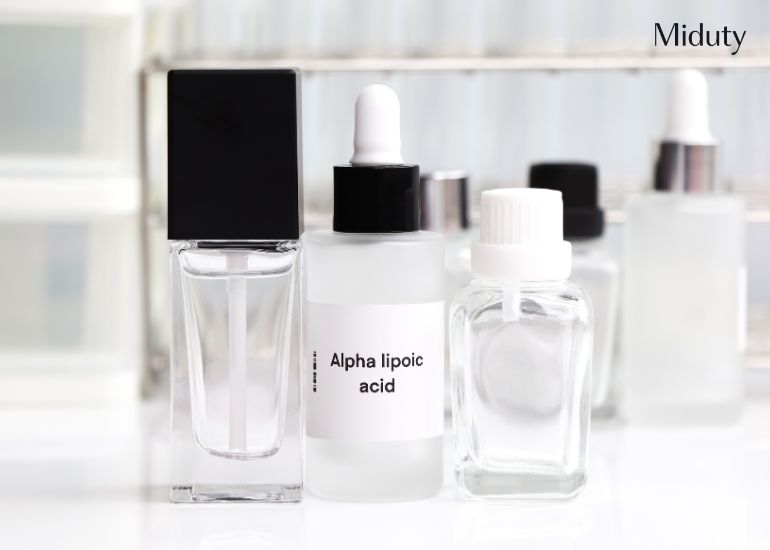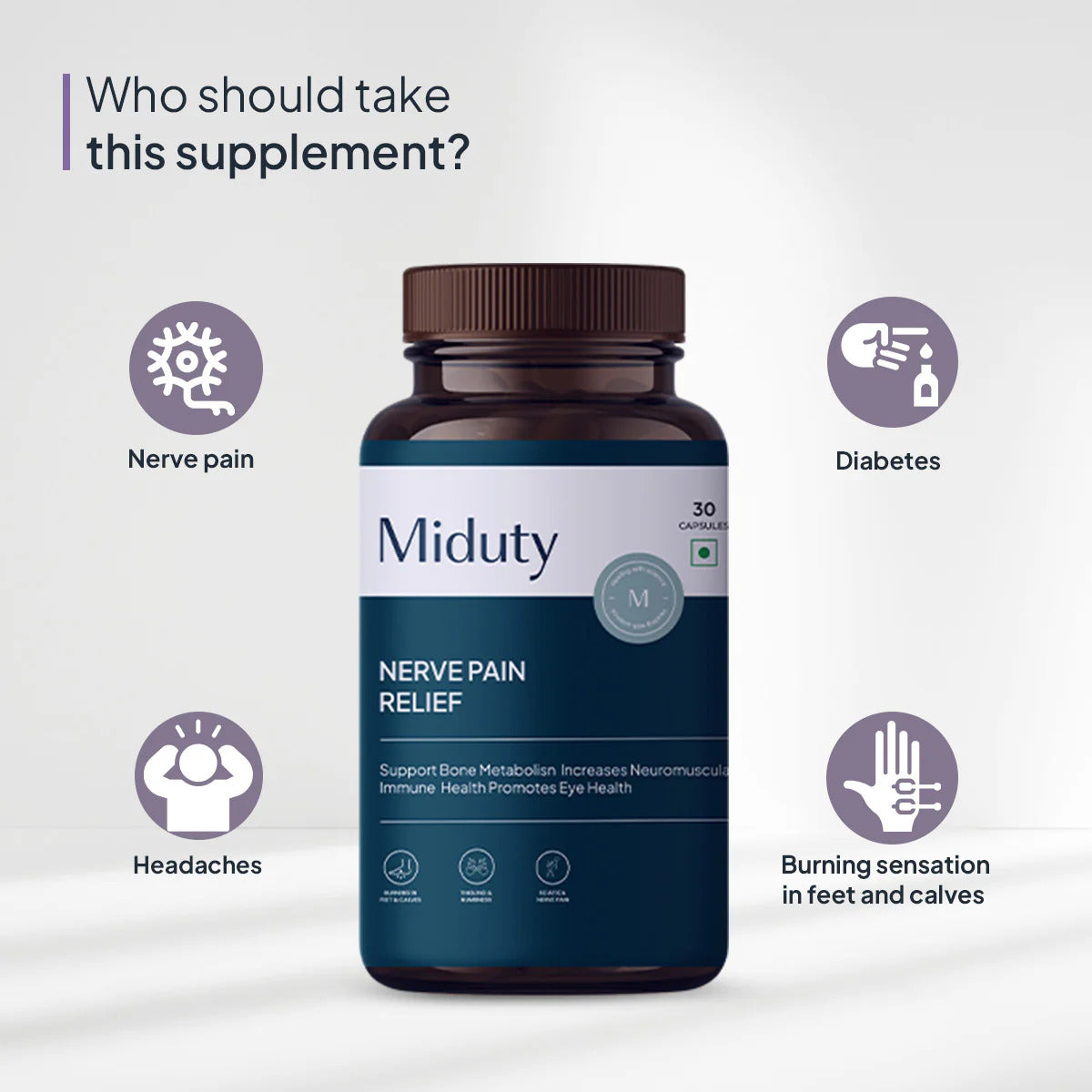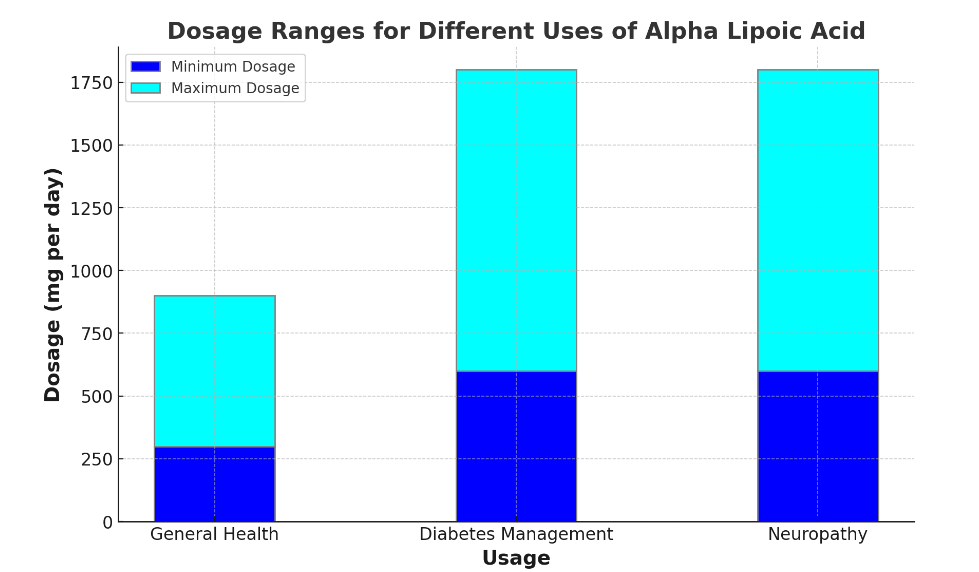
Alpha Lipoic Acid (ALA) is a naturally occurring compound found in every cell of the human body. It plays a critical role in energy production, helping to convert glucose into energy.
ALA is both fat and water-soluble, which means it can work throughout the body. As an antioxidant, it helps combat oxidative stress and protects against cellular damage. ALA is also known to regenerate other antioxidants, such as vitamins C and E, enhancing their effectiveness.
There are two main forms of alpha-lipoic acid (ALA): R-alpha-lipoic acid and S-alpha-lipoic acid. R-alpha-lipoic acid is the naturally occurring form and is considered superior because it's more bioavailable, meaning the body can use it more effectively. S-alpha-lipoic acid, while synthetic, is often less effective and may not provide the same health benefits. Overall, R-alpha-lipoic acid is the preferred choice for optimal health benefits.

R-lipoic acid, featured in Miduty Nerve Pain Relief, is the most bioavailable and naturally occurring form of Alpha Lipoic Acid. This ensures that your body can absorb and utilize it more effectively than other forms of lipoic acid.
Unlike other products on the market, Miduty Nerve Pain Relief contains a stabilized form of R-Lipoic Acid. This stability enhances its potency and effectiveness, making it a superior choice for supporting nerve health and alleviating nerve pain.
Most nutraceuticals use a chemically synthesized form of Alpha Lipoic Acid, known as S-lipoic acid, which is a synthetic byproduct. Miduty Nerve Pain Relief, however, uses only 100% R-Lipoic Acid, the active form that is naturally produced and utilized by the human body. Research has shown that R-lipoic acid is significantly more effective than the combined "R" and "S" forms typically found in other supplements.
| Uses & Benefits |
Description |
|
Antioxidant Support  |
ALA neutralizes harmful free radicals, protecting cells from damage. What makes ALA special is that it works in both water and fat environments, meaning it can protect different parts of your cells. It also helps regenerate other important antioxidants, like vitamins C and E, making them more effective. [1] |
|
Energy Production  |
Alpha-lipoic acid (ALA) plays a key role in energy production by helping the body's mitochondria, which are the "powerhouses" of cells, convert glucose into energy. ALA supports enzymes that break down carbohydrates and turn them into usable energy (ATP). This process not only boosts energy levels but also makes cells more efficient, reducing fatigue. [2] |
|
Diabetes Management  |
Alpha-lipoic acid (ALA) can help manage diabetes by improving insulin sensitivity and lowering blood sugar levels. It enhances the body's ability to use glucose more effectively, which can reduce insulin resistance—a common issue in people with type 2 diabetes. It improves insulin sensitivity and reduces symptoms of diabetic neuropathy. [3] |
|
Skin Health  |
Alpha-lipoic acid (ALA) benefits skin health by acting as a potent antioxidant that protects against damage from free radicals, which can lead to premature aging. It helps reduce the appearance of fine lines, wrinkles, and sun damage by boosting the skin's ability to repair itself. ALA also promotes the regeneration of other antioxidants like vitamins C and E, which are important for maintaining a youthful, healthy complexion. [4] |
|
Neurological Health  |
It supports neurological health by protecting nerve cells from oxidative stress and inflammation, which can contribute to conditions like Alzheimer's, Parkinson's, and peripheral neuropathy. Its antioxidant properties help prevent damage to brain cells, while its ability to regenerate other antioxidants, such as glutathione, strengthens the body's defense against neurodegenerative diseases. [5] |
|
Reduces Inflammation  |
Alpha-lipoic acid (ALA) helps reduce inflammation by neutralizing harmful free radicals and decreasing the production of pro-inflammatory molecules in the body. Its powerful antioxidant properties protect cells from oxidative stress, which is a key driver of chronic inflammation. [6] |
|
Supports Weight Loss  |
It helps in weight loss by improving metabolism and helping the body use energy more efficiently. It enhances the function of mitochondria, the cell's energy producers, which helps burn fat more effectively. ALA also improves insulin sensitivity, allowing for better blood sugar control, which can reduce cravings and prevent fat storage. [7] |
|
Improves Heart Health  |
ALA supports heart health by improving blood vessel function and reducing oxidative stress, which can contribute to cardiovascular diseases. Its antioxidant properties help protect the heart and blood vessels from damage caused by free radicals, while its ability to lower inflammation further protects against heart issues. ALA also improves cholesterol and triglyceride levels, helps regulate blood pressure, and enhances insulin sensitivity. [8] |
|
Detoxification  |
It helps in the detoxification of heavy metals, such as mercury, arsenic, and lead, by binding to these toxic metals and neutralizing their harmful effects. As a potent antioxidant, ALA helps protect cells from oxidative stress caused by metal toxicity. It also enhances the activity of other detoxifying agents like glutathione, which further assists in the removal of these metals from the body. [9] |
|
Enhanced Glutathione Levels  |
ALA helps boost glutathione production by acting as a powerful antioxidant in the body. It assists in recycling and regenerating other antioxidants, including glutathione itself. By enhancing the levels of key nutrients and supporting the enzymes needed for glutathione synthesis. [10] |
Here are the sources of alpha-lipoic acid (ALA) in a catchy pointer format:
Mix and match these delicious options to fuel your body with this amazing antioxidant!

It's essential to start with a lower dose and gradually increase it, depending on individual tolerance and response.
Side effects of ALA in supplement form are usually rare, but for some, they might include:
Currently, alpha-lipoic acid supplements are not studied in children or pregnant/breastfeeding women, so they're meant for adults only. It's always best to consult a healthcare provider before starting any new supplement!
Consult a Healthcare Provider: Before starting ALA supplementation, especially if you have underlying health conditions or are taking other medications.
Balanced Diet: Ensure a diet rich in ALA-containing foods to naturally boost levels.
Hydration: Maintain adequate hydration to support metabolic processes and detoxification.
Monitor Blood Sugar: If you have diabetes, regularly monitor your blood sugar levels to avoid hypoglycemia.
Store Properly: Keep supplements in a cool, dry place away from direct sunlight to maintain potency.
Alpha Lipoic Acid is a versatile and potent antioxidant that offers numerous health benefits, from enhancing energy production and reducing inflammation to managing diabetes and improving skin health.
While naturally found in some foods, supplementation can help achieve therapeutic levels, particularly for specific health concerns. As with any supplement, it's crucial to use ALA responsibly, paying attention to dosage and potential side effects, and to consult with a healthcare professional to tailor its use to your individual needs.
